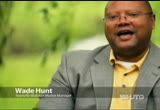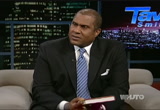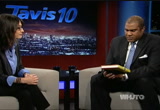tv Tavis Smiley WHUT February 6, 2013 8:00am-8:30am EST
8:00 am
tavis: good evening. from los angeles, i am tavis smiley. tonight a conversation about haiti's with the noted author, amy wilentz. her latest focuses on the caribbean nation and is called "farewell, fred voodoo." it looks that he be's efforts to rebuild after the earthquake and seeks to debunk who -- it looks at haiti's efforts to rebuild after the earthquake. king had that said there is always the right time to do the right thing. by doing the right thing. we know that we are only halfway to completely
8:01 am
eliminating hunger and we have work to do. fighting hunger in the u.s. as we work together, we can stamp hunger out. pbs station from viewers like thank you. tavis: jamie williams is a noted author. she is -- amy wilentz is a noted author. her latest revisits the nation of haiti. it is called "farewell, fred
8:02 am
voodoo." we should start by talking about the title. >> friend voodoo is a name the international press corps used to name for the haitian on the street. what i would like to say is they are trained to go deeper than that and not just have a stereotypical view of haitians and what old colonists used to associate with their religion, but something real and in control of their own will, so farewell to the old image. let's look get the new -- look at the new haiti. tavis: what would you say is the typical american view? >> there is a lot of reality. impoverished. we associate in the u.s.
8:03 am
poverty with backwardness, especially in a nation filled with akron people is american thing. and there is to do, -- is voodoo, and that image of them being associated with religion thought of assets -- as superstition and black magic. i have gone to a lot of voodoo ceremonies, and they are not what the american impression is. >tavis: how wrong with you say the impression is that we have of haiti? >> i would say in many ways it is incorrect. haitians, once removed from port-au-prince, if you go to a
8:04 am
village, these people are self- sufficient. they are poor, but they are communitarian. they help each other. they worked together, but once you put them in a cash economy, competition becomes very tense for a few resources. tavis: what entity, individual branch would you point the finger at for who is responsible for this continuing chaos? >> mother nature had a role in it, but he was already having trouble functioning before the earthquake struck. i hate to point the finger, but along difficult relationship with the united states is definitely a reason. finger at e haitian revolution.
8:05 am
it ended with victorious former slaves having defeated napoleon bonaparte. this was a shock to the united states, and as frederick douglass says, the u.s. has not forgiven heydey for being black. i think we could point to the revolution. it placed haiti firmly in the way of the united states until 1867 when he was first recognized, after the revolution. -- when haiti was first recognized, after the revolution. >> douglas said that a long time ago, which leads to the question that we still have not forgiven haiti for being black and independent. >> i think it is true, but haiti has played into the distressed relationship between haiti and the u.s. by becoming dependent
8:06 am
on outside stuff and falling into the trap of the global markets so it has not remain with a red cells, but there is a sick relationship -- not remained its upright self, so there is a sick relationship. it is a function of corruption but serves the purposes of outsiders when they do business in haiti. you pay a bribe, which is cheaper than paying taxes. you pay a bribe to one government official. is a business practice and has been for at least a century. tavis: the question is how does that lead to haiti getting stuck where it is, because it is not the only government with officials who take bribes. so we list of names?
8:07 am
until the other day there were not one but two former governor is -- governors in illinois who were imprisoned at the same time. you have got to tell me more than just corruption that has the people in this quandary. but there is corruption, and there is racism, and if you look, martinique and guadeloupe are part of france. france sent them on, and they are the descendants of slaves. they do not have the situation in haiti has, which is an outcast. i think what frederick douglass says, which is true. after the earthquake there were incredible articles. pat robinson said patients made a pact with the devil. it was the first time he seemed to be on the side of the french,
8:08 am
and many conservatives and moderate columnists attack patients as having brought this upon themselves, and i do not believe that is true. i think that is a position they have in the western hemisphere as an african nation that has led to a lot of prejudice against them by the countries that surround them. >> how would you respond to those who say the cosmos has lined up against haiti? >> i do not believe that. i am pretty much an atheist, so because most does not do much. it is an island that has had a lot of hurricanes, but everyone has had a lot of hurricanes. the cosmos have not lined up against them. that is for people who believe in voodoo. tavis: there are folks who believe that. >> haitians were saying maybe
8:09 am
everything is against us, because it is a hard life, and the earthquake made it hard and sad, so there were people saying this, but we cannot believe that, because we are enlightened. tavis: some will call this oversimplification, but when you dig deeper, not so much. good so much of u.s. foreign policy has to do with what have you done for me lately or what can you do for me down the road. with that in mind, what does he need do for us -- what does haiti do for us? >> there has been a long time when we do not want a lot of haitians in southern florida. in early days haiti controlled an important slice of water,
8:10 am
which gave naval access to the caribbean, so that mattered a lot in the old days and for military matters with latin america, but what can they do for us in the future? they cannot be unstable. also, there is a lot of business investment in haiti, and now haiti is being opened to mining interests, both canadian and u.s. mining interest. there is a huge amount of gold and silver and copper to be found underneath the surface, but people have not come in before because haitians will not allow them to come in on on fair terms, but those will be changed, and now mining companies can explore wherever they want. tavis: you talk about these organizations. have the ngos been good or bad
8:11 am
for haiti? >> release is necessary. good when you're buildings have fallen down, relief is necessary. you have got to pull bodies out of the rubble. you have to do take care of people. you have to make sure there is water and sanitation for people who have been injured. after that, there is a combination. they are trying to build haiti back better, but they do not know how, because they are not haitians. i think there is confusion over what the goals are of the reconstruction effort, and who is deciding what is better? haitians were not decided what is included. tavis: since then they have a new president, so who is making those decisions about what makes for a better haiti?
8:12 am
>> i think it is the giant organizations that cavemen end -- that came in. the french government, the u.s. government. they had a large role in deciding where money would go after the earthquake. they would meet in clusters and not even invited to the haitian president. the new president was seen as a good partner for this kind of reconstruction, but basically he was a rubber stamp. he is good to include. tavis: if the president is essentially a rubber stamp, how do you turn the tide against what is happening? >> i think the tide is turning a little bit, but i am worried. i think reconstruction is pulling up stakes.
8:13 am
it is interesting to the international community. it has been three years. a lot of organizations are moving away from haiti. those who will stay long term, those are the ones that will care and learn about haiti and learn how to help haiti help itself instead of learning how to impose their idea of what would be good. tavis: has the money been getting to where it needed to bee? a lot of people gave money to relief efforts. has the money been getting to where it needs to be? >> you imagine a little boy with one arm is going to be held with your money. i do not think it works out easily. i think it goes to a big organization that has to spend
8:14 am
money on payroll. it has to spend money on vehicles. it has to spend money on housing. it goes to those things. then they begin to figure out what they are going to do with that money, and that takes a lot of time. people go through many iterations. what should we make the housing out of them of what is the best thing? it is incredible what it takes when these people are talking to each other. sometimes i think if they had just taken the money and given it to each household, it would have spurred the economy and now and none more for the way patients want to see it done the and the way it ended up. -- it would have spurred the economy and done more for the way haitians want to see it done and the way it ended up. >> we do not believe about their
8:15 am
ability. >> we see them as this nothingness on whom ideas and ways of being can be imposed , but they are not that way at all. you cannot believe how much work is being done. because they are unemployed, they are trying to find ways to make money. it is shocking the amount of activity that goes into making a small amount of money and now every day. there's a lot of will to do better, and there is a lot of will to work really hard, but there is no place to put all , because there are not so many businesses. tavis: if the economy could begin to work like a well oiled
8:16 am
machine, help me imagine what that would look like. what are they producing? what are they being compensated for? what resources exist to make the island self-sufficient? >> they are agriculturally self- sufficient. that is what i would like to see. before subsidized rice came in and undercut the cultivator, that would be step one. i would like to see them join into cooperatives so they could export their own produce, which they could do. i would like to see the rum industry take off in haiti. the sugar industry is dead in haiti, and is alive in the dominican republic. i would like to see that industry back in haiti instead
8:17 am
of the dominican republic, so agriculture. there can be industrialization as long as it is controlled by haitians. patients are very good at all sorts of small needlework. good -- haitians are very good at all sorts of small needlework greater than there is mining. tavis: you mentioned bill clinton, who has had a renaissance, and his numbers are as high-end as they have ever been. his numbers are often higher. he has been our point person on this project since the earthquake happened. assess with me how he has done. >> he could not get done the things he would like to get done. he was on the interim commission
8:18 am
for the recovery of haiti, and that was almost no as on the commission that lasted for two years. he raised a lot of money for president bush, and they spent about four loans of small businesses, and maybe that is a good idea, but they were the same kinds of businesses. they use earthquake money to do the same kinds of programs. clinton has a long relationship with haiti. the people he knows are not the most imaginative. they are the elite. that is normal. he is a former u.s. president. he does not get down and 30 in the shanty towns, but he needs to have people do that if he is going to continue. >> who is going to get down and dirty? >> i have a doctor. she is wonderful, but she is small scale.
8:19 am
she learned creole at the general hospital, and slowly but surely, she started to develop a tuberculosis ward in a hospital, where there was not one, even though they have one of the worst burdens of tuberculosis. now she has a fund-raising organization. her aid is very targeted. she will say, i need a computer, and you give the money, and the patient gets a computer. she is the vessel through which these things flow. instead of the money sits in the coffers. tavis: i have said many times over the years.
8:20 am
i am not a fan of any number of movies where the white folk ride in and rescue the black folk. i am over those kinds of stories. i am raising it, because i wonder how we aid and abet haiti in the right way but not have this imagery we know best and we know everything and we are here to save you, rescue you, and without us, you cannot make it. how do we aid and abet them to but not be guilty of that? >> it is really hard. one of the reasons i like this dr. and one of the reasons i like sean penn, although he is a swashbuckler. he looks like a swashbuckler. he appears to be above and beyond anybody because he is a movie star, but he gets in with
8:21 am
the haitian people and knows all about them because he spent three years there. the same with nagin coffee. she lets haitians teach her. when you go with so much money you are bound to look like the white man coming to the rescue. it is much better to do it in a diffuse way, but then what happens is no one knows what is going on. there are too many little organizations. there are so many white people who want to save the poor haitians. it is a crisis of american thinking, and i do not understand that, but i will raise i suffer that. -- i worry i suffer that. tavis: what makes it a hopeful? i assume you still are.
8:22 am
good >> you have to be hopeful. what makes the hopeful is the spirit of the haitian people, and it is not because they are haitian. it is the goes they are human, and they have suffered through a lot of stuff, -- it is because they are human, and they have suffered through a lot of stuff. they have survived. i have to have hope for them. i know how smart i haitian friends are and how wise they are in the worst conditions. imagine if they could pull out of the yoke that has been on them and do things the way they want to do them. tavis: i have heard countless people say the spirit of the haitian people is in abominable. it is true. where is the evidence that
8:23 am
indomitable energy has memorized? >> it is the evidence they are still there. this is something i have thought, and maybe it is not a politically correct thing. sometimes it is maybe the reason the reconstruction effort did not work is the haitians did not like the reconstruction effort. they wanted to get money out of it, but they did not want the way it was imposed, and that is part of why it did not work. that is a big effort to make to stop that kind of thing from working and imposing an outside culture on you. tavis: did you ever see a process by which the haitian people will be able to use the
8:24 am
agency they do have to raise their voice about the things that mattered to them and said the country on a course that does lead to real reconstruction who? >> i think it needs a good government in the united states and a good government in haiti. tavis: good luck on that. >> in both places. what normally have since -- happens is a controlled government in the u.s. and a controlled government in haiti. when he came to power the united states cannot tolerate it. whatever our involvement was, he fell, and clinton put him back in power. it was not the same man, but it was the same symbol. even that was intolerable.
8:25 am
that was not really tolerated, and i do not think you can have self empowerment in haiti unless the united states agrees to it. tavis: the new book is called "farewell, fred voodoo." good to have you on the program. that is our show for tonight. i will see you next time. until then, tonight from los angeles. as always, keep the faith. >> for more information on today's show, visit tavis smiley at pbs.org. tavis: hi, i'm tavis smiley. join me next time for a conversation with "scandal" star tony goldwyn for his role playing the president. that is next time. we will see you then. always the right time to do the right thing. i try to live my life every day
8:26 am
47 Views
IN COLLECTIONS
WHUT (Howard University Television) Television Archive
Television Archive  Television Archive News Search Service
Television Archive News Search Service 
Uploaded by TV Archive on

 Live Music Archive
Live Music Archive Librivox Free Audio
Librivox Free Audio Metropolitan Museum
Metropolitan Museum Cleveland Museum of Art
Cleveland Museum of Art Internet Arcade
Internet Arcade Console Living Room
Console Living Room Books to Borrow
Books to Borrow Open Library
Open Library TV News
TV News Understanding 9/11
Understanding 9/11




























